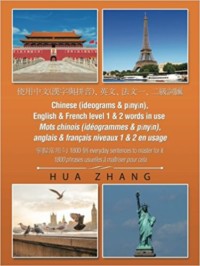Title: Chinese (Ideograms & Pīnyīn), English & French Level 1 & 2 Words In Use
Author: Hua Zhang
Publisher: AuthorHouseUK
ISBN: 9781546280941
Pages: 104
Genre: Foreign Language Study/ Reference
Reviewed by: Barbara Bamberger Scott
Pacific Book Review
This is the latest in a series of textbooks composed by Hua Zhang with language learning tips for Chinese, French and English speaking students. This volume is geared towards those with Level 1 or 2 Vocabulary in Chinese. It offers three-way translation of 640 words and expressions in Chinese, corresponding to 1,100 such words and expressions in English and 1,050 in French. It offers 1,800 everyday sentences (idioms or ideograms) that can be used in everyday life, according to language instructor Hua Zhang.For an English or French speaking student, the information follows the Western alphabet. Each word or phrase is first shown in Chinese characters, then in a word of Chinese transcribed to the Western alphabet with appropriate accenting. After the literal translation comes a series of idiomatic expressions, adages and the like, as well as useful informational sentences.
A rather delightful example is nüren, the Chinese word for wife. An example given by the author of usage in French is “c’est sa femme,” translated here as “she’s his woman.” His example of a possible usage in English for this word is, “I’d better ask the wife if she wants to come.” Another sample is the word ting, meaning “listen.” In French, one might say “Ecoutez-bien” or “listen carefully.” The English sampling given for ting is, “If only I’d listened to my mother!” Other practical common words include: huì (meeting in English, reunion in French); kâoshì for examination, and qîng for please. By these examples, it’s plain that the author has extensive knowledge of all three languages and seeks to make learning both easy and interesting for the students who use his guide. The alphabetical listing of words and phrases is followed by an index of all words cited in the lexicon, and a list of Chinese, French and English dictionaries for further reference.
The author has a foreign language degree from Beijing Foreign Languages Studies University in China, and has studied and taught in France. This is one of several tri- lingual manuals he has created for serious home study. This book is extremely helpful and useful to all people who learn Chinese, French, and English with different purposes and ways, such as classroom students, self-learners, or travelers.


